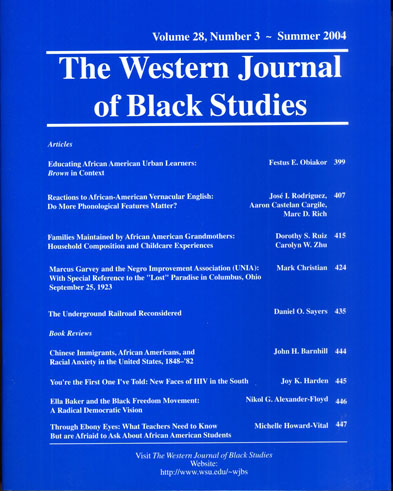Volume 28, Issue 3
Educating African American Urban Learners:
Brown in Context
Festus E. Obiakor
The Brown v. Board of Education case of 1954 was one of initial stages to address problems of educational and social inequities in school programs. It challenged prejudicial exclusion and discriminatory policies that failed to respect the equal rights of students. However, about 50 years later, many African American urban learners are not enjoying the fruits of Brown. As it appears, many of them are still excluded in educational programs through consistent misidentification, misassessment, miscategorization, misplacement, and misinstruction/misintervention. This article examines these issues as they relate to the Brown case.
pp. 399-406
Reactions to African-American Vernacular English:
Do More Phonological Features Matter?
José I. Rodriguez, Aaron Castelan Cargile, Marc D. Rich
This study examined the relationship between the strength of speaker accent and subsequent listener judgments about the speaker. The study employed a 3x2 factorial design featuring speaker accent (strong AAVE/ moderate AAVE/ mainstream U.S. English) and listener ethnicity (ethnic majority/ ethnic minority). Results demonstrated that listeners rated speakers with strong AAVE accents both less attractive and less status-possessing than speakers with moderate AAVE accents, who in turn were rated as less attractive and status-possessing than speakers with mainstream U. S. English accents. In addition, listener ethnicity also had an impact resembling in-group bias. Even so, the results still demonstrated a trend consistent with the generalization that both dominant and non-dominant group members internalize the language ideology that favors so-called “standard” speakers.
pp. 407-414
Families Maintained by African American Grandmothers:
Household Composition and Childcare Experiences
Dorothy S. Ruiz, Carolyn W. Zhu
The article is a descriptive analysis of household characteristics of co-resident children and grandchildren among families maintained by African American grandmothers. Using a purposive sampling design, ninety-nine custodial African American grandmothers, caring for one or more grandchildren, were included in this analysis. Households with neither biological parent present were the majority in African American households. Fifty-six percent of the grandmothers were caring for grandchildren without any adult children in the home. African American grandmothers care for their grandchildren for long periods of time. Thirty-four percent of the grandchildren had been in their grandmothers’ care for 10 or more years. The prevalence of households maintained by single grandmothers, and the extensive period of caregiving suggest the need for additional research and practice intervention.
pp. 415-423
Marcus Garvey and the Universal Negro Improvement Association (UNIA):
With Special Reference to the "Lost" Parade in
Columbus, Ohio, September 25, 1923
Mark Christian
Marcus Garvey and Universal Negro Improvement Association (UNIA) made a tremendous impact on the social consciousness of African descended peoples throughout the world in the 1920s–1930s. African Americans were particularly influenced by the philosophy and opinions of Garvey and the UNIA. The key scholars in Garveyism (such as Amy Jacques Garvey, E. David Cronon, Tony Martin, Robert A. Hill, Rupert Lewis, and John Henrik Clarke) have mainly focused on the macro aspects of the Garvey movement with little focus on the micro characteristics.. For example, what was the nuanced Garvey experience at the local branch/ chapter level in various cities? This question leads into this exploratory study of a Mid-Western US city: Columbus, Ohio. Marcus Garvey and the UNIA had tremendous support in Ohio and this article will put the movement in context via what can be deemed a “lost” parade that took place in Columbus, Ohio, on Tuesday September 25, 1923. What is most significant about this knowledge is that it provides an insight into and establishes the popularity of the UNIA during a time when Marcus Garvey was being hounded by the established order.
pp. 424-434
The Underground Railroad Reconsidered
Daniel O. Sayers
Taking an anthropological and historical position, this paper explores the Underground Railroad as a long-term process of African-American defiance and marronage. Fugitives who fled to locales outside of established slavery systems in North America had political-economic impacts across agrarian and urban sectors as will be discussed through a research-based case study from Battle Creek, Michigan. In adopting a Diasporic marronage perspective, Underground Railroad researchers may positively contribute to modern political and social discourses. The weaving together of several theoretical, historical, and modern political issues demonstrates that Diasporic historical interpretations can have a strong role in recasting modern views of historical social processes and help inform human action in the present.
pp. 435-443
Book Reviews
Chinese Immigrants, African Americans, and Racial Anxiety
in the United States, 1848–82
Author: Najia Aarim-Heriot
Reviewed By: John H. Barnhill
p. 444
"You're the First One I've Told: New Faces of HIV in the South"
Authors: Kathryn Whetten-Goldstein and Trang Quyen Nguyen
Reviewed By: Joy K. Harden
pp.445-446
Ella Baker and the Black Freedom Movement:
A Radical Democratic Vision
Author:Barbara Ransby
Reviewed By: Nikol G. Alexander Floyd
pp.446-447
Through Ebony Eyes:
What Teachers Need to Know but Are Afraid to Ask
About African American Students
Author: Gail L. Thompson
Reviewed By: Michelle Howard
447-448

| The WJBS site is normally maintained by Tanya Gonzales. Please feel free to e-mail comments, queries, and suggestions. |
Heading using the h3 tag
Lorem ipsum dolor sit amet, consectetur adipisicing elit, sed do eiusmod tempor incididunt ut labore et dolore magna aliqua. Ut enim ad minim veniam, quis nostrud exercitation ullamco laboris nisi ut aliquip ex ea commodo consequat. Duis aute irure dolor in reprehenderit in voluptate velit esse cillum dolore eu fugiat nulla pariatur. Excepteur sint occaecat cupidatat non proident, sunt in culpa qui officia deserunt mollit anim id est laborum.